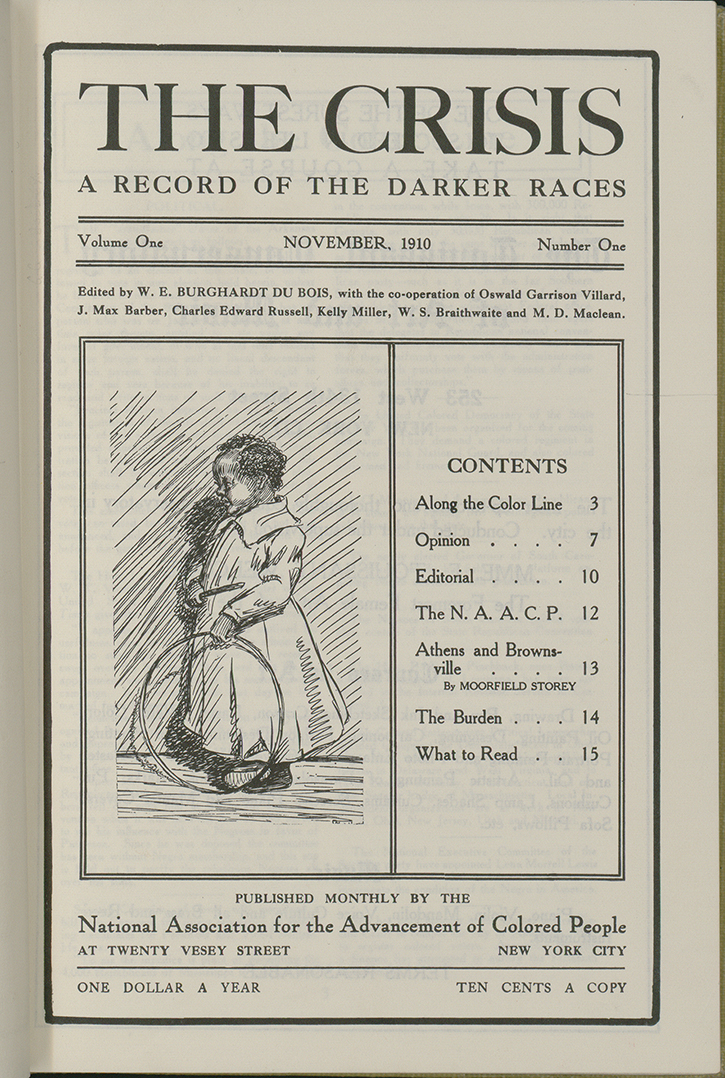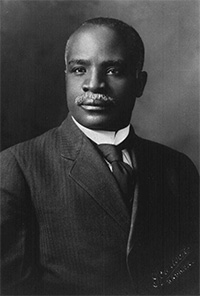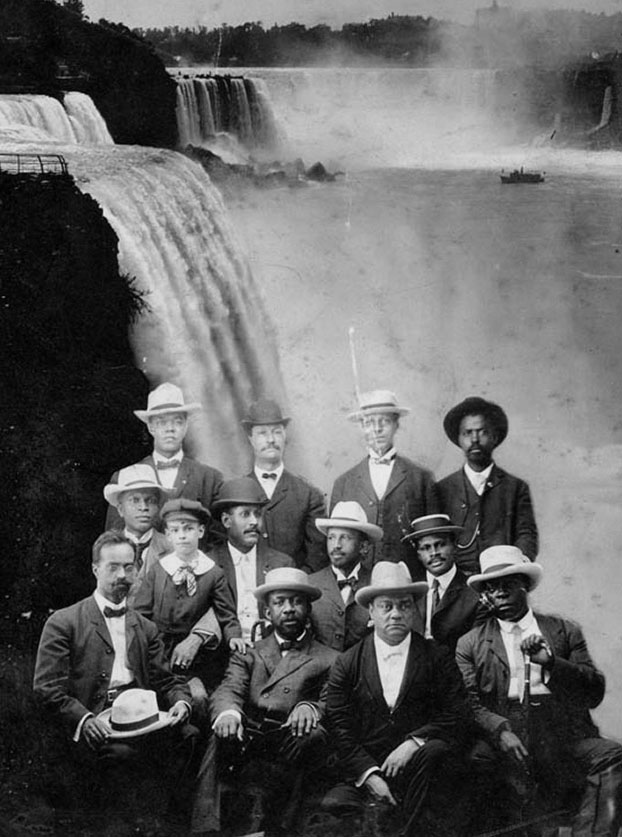|
Kelly Miller (scientist)
Kelly Miller (July 18, 1863 – December 29, 1939) was an American mathematician, sociologist, essayist, newspaper columnist, author, and an important figure in the intellectual life of black America for close to half a century. He was known as "the Bard of the Potomac". Early life and education Kelly Miller was the sixth of three children born to Elizabeth Miller and Kelly Miller Sr. His mother was a former slave and his father was a freed black man who was conscripted into the Winnsboro Regiment of the Confederate Army. Miller was born in Winnsboro, South Carolina, where he would attend local primary and grade school. From 1878–1880, Miller attended the Fairfield Institute. Based on his achievements, he was offered a scholarship to Howard University, a historically black college. Miller finished the preparatory department's three-year curriculum in Latin and Greek, then mathematics, in two years. After finishing one department, he quickly moved on to the next one. Mille ... [...More Info...] [...Related Items...] OR: [Wikipedia] [Google] [Baidu] |
Winnsboro, South Carolina
Winnsboro is a town in Fairfield County, South Carolina, United States. The population was 3,550 at the 2010 census. The population was 3,215 at the 2020 census. A population decrease of approximately 9.5% for the same 10 year period. It is the county seat of Fairfield County. Winnsboro is part of the Columbia, South Carolina metropolitan area. Winnsboro is a suburb of a Columbia, South Carolina. History Based on archeological evidence, this area of the Piedmont was occupied by various cultures of indigenous peoples from as early as the Archaic period, about 1500 BC. Blair Mound is a nearby archeological site and earthwork likely occupied 1300-1400 AD, as part of the late Mississippian culture in the region. Several years before the Revolutionary War, Richard Winn from Virginia moved to what is now Fairfield County in the upland or Piedmont area of South Carolina. His lands included the present site of Winnsboro. As early as 1777, the settlement was known as "Winnsborough" si ... [...More Info...] [...Related Items...] OR: [Wikipedia] [Google] [Baidu] |
Howard University School Of Law
Howard University School of Law (Howard Law or HUSL) is the law school of Howard University, a private, federally chartered historically black research university in Washington, D.C. It is one of the oldest law schools in the country and the oldest historically black law school in the United States. Today, Howard University School of Law confers about 185 Juris Doctor and Master of Law degrees annually to students from the United States and countries in South America, the Caribbean, Africa, and Asia. Howard University School of Law was accredited by the American Bar Association and the Association of American Law Schools in 1931. History Howard University opened its legal department, led by John Mercer Langston, on January 6, 1869. The founders of Howard Law recognized "a great need to train lawyers who would have a strong commitment to helping black Americans secure and protect their newly established rights" during the country's tumultuous Reconstruction era. The first class co ... [...More Info...] [...Related Items...] OR: [Wikipedia] [Google] [Baidu] |
National Association For The Advancement Of Colored People
The National Association for the Advancement of Colored People (NAACP) is a civil rights organization in the United States, formed in 1909 as an interracial endeavor to advance justice for African Americans by a group including W. E. B. Du Bois, Mary White Ovington, Moorfield Storey and Ida B. Wells. Leaders of the organization included Thurgood Marshall and Roy Wilkins. Its mission in the 21st century is "to ensure the political, educational, social, and economic equality of rights of all persons and to eliminate race-based discrimination". National NAACP initiatives include political lobbying, publicity efforts and litigation strategies developed by its legal team. The group enlarged its mission in the late 20th century by considering issues such as police misconduct, the status of black foreign refugees and questions of economic development. Its name, retained in accordance with tradition, uses the once common term ''colored people,'' referring to tho ... [...More Info...] [...Related Items...] OR: [Wikipedia] [Google] [Baidu] |
The Crisis
''The Crisis'' is the official magazine of the National Association for the Advancement of Colored People (NAACP). It was founded in 1910 by W. E. B. Du Bois (editor), Oswald Garrison Villard, J. Max Barber, Charles Edward Russell, Kelly Miller, William Stanley Braithwaite, and Mary Dunlop Maclean. ''The Crisis'' has been in continuous print since 1910, and it is the oldest Black-oriented magazine in the world. Today, ''The Crisis'' is "a quarterly journal of civil rights, history, politics and culture and seeks to educate and challenge its readers about issues that continue to plague African Americans and other communities of color." History The Du Bois era Beginnings and the Du Bois era The original title of the magazine was ''The CRISIS: A Record of The Darker Races''. The magazine's name was inspired by James Russell Lowell's 1845 poem, "The Present Crisis". The suggestion to name the magazine after the poem came from one of the NAACP co-founders and noted white ab ... [...More Info...] [...Related Items...] OR: [Wikipedia] [Google] [Baidu] |
Free Market
In economics, a free market is an economic system in which the prices of goods and services are determined by supply and demand expressed by sellers and buyers. Such markets, as modeled, operate without the intervention of government or any other external authority. Proponents of the free market as a normative ideal contrast it with a regulated market, in which a government intervenes in supply and demand by means of various methods such as taxes or regulations. In an idealized free market economy, prices for goods and services are set solely by the bids and offers of the participants. Scholars contrast the concept of a free market with the concept of a coordinated market in fields of study such as political economy, new institutional economics, economic sociology and political science. All of these fields emphasize the importance in currently existing market systems of rule-making institutions external to the simple forces of supply and demand which create space for those ... [...More Info...] [...Related Items...] OR: [Wikipedia] [Google] [Baidu] |
Chicago
(''City in a Garden''); I Will , image_map = , map_caption = Interactive Map of Chicago , coordinates = , coordinates_footnotes = , subdivision_type = Country , subdivision_name = United States , subdivision_type1 = State , subdivision_type2 = Counties , subdivision_name1 = Illinois , subdivision_name2 = Cook and DuPage , established_title = Settled , established_date = , established_title2 = Incorporated (city) , established_date2 = , founder = Jean Baptiste Point du Sable , government_type = Mayor–council , governing_body = Chicago City Council , leader_title = Mayor , leader_name = Lori Lightfoot ( D) , leader_title1 = City Clerk , leader_name1 = Anna Valencia ( D) , unit_pref = Imperial , area_footnotes = , area_tot ... [...More Info...] [...Related Items...] OR: [Wikipedia] [Google] [Baidu] |
Civil Rights
Civil and political rights are a class of rights that protect individuals' freedom from infringement by governments, social organizations, and private individuals. They ensure one's entitlement to participate in the civil and political life of society and the state without discrimination or repression. Civil rights include the ensuring of peoples' physical and mental integrity, life, and safety; protection from discrimination on grounds such as sex, race, sexual orientation, national origin, color, age, political affiliation, ethnicity, social class, religion, and disability; and individual rights such as privacy and the freedom of thought, speech, religion, press, assembly, and movement. Political rights include natural justice (procedural fairness) in law, such as the rights of the accused, including the right to a fair trial; due process; the right to seek redress or a legal remedy; and rights of participation in civil society and politics such as freedom of associati ... [...More Info...] [...Related Items...] OR: [Wikipedia] [Google] [Baidu] |
Negro Sanhedrin
The Negro Sanhedrin was a national "All-Race Conference" held in the American city of Chicago, Illinois, from February 11 to 15, 1924. The gathering was attended by 250 delegates representing 61 trade unions, civic groups, and fraternal organizations in a short-lived attempt to forge a national program protecting the legal rights of African-American tenant farmers and wage workers and extending the scope of civil rights. History Background The idea for a national conference bringing together representatives of African-American organizations came in the spring of 1923, following Congressional defeat of the Dyer Anti-Lynching Bill.Joyce Moore Turner with W. Burghardt Turner, ''Caribbean Crusaders and the Harlem Renaissance.'' Urbana, IL: University of Illinois Press, 2005; pg. 113. William Monroe Trotter of the National Equal Rights League (NERL) of Boston is credited with originating the idea for assembly of a national council of prominent black leaders. This idea was passed alo ... [...More Info...] [...Related Items...] OR: [Wikipedia] [Google] [Baidu] |
Niagara Movement
The Niagara Movement (NM) was a black civil rights organization founded in 1905 by a group of activists—many of whom were among the vanguard of African-American lawyers in the United States—led by W. E. B. Du Bois and William Monroe Trotter. It was named for the "mighty current" of change the group wanted to effect and took Niagara Falls as its symbol. The group did not meet in Niagara Falls, New York, but planned its first conference for nearby Buffalo (at the last minute, to avoid disruptions, moved across the Niagara River to Fort Erie, Ontario, Canada). The Niagara Movement was organized to oppose racial segregation and disenfranchisement. Its members felt "unmanly" the policy of accommodation and conciliation, without voting rights, promoted by Booker T. Washington. Background During the Reconstruction Era that followed the American Civil War, African Americans had an unprecedented level of civil freedom and civic participation. In the South, for the first time the for ... [...More Info...] [...Related Items...] OR: [Wikipedia] [Google] [Baidu] |
Education
Education is a purposeful activity directed at achieving certain aims, such as transmitting knowledge or fostering skills and character traits. These aims may include the development of understanding, rationality, kindness, and honesty. Various researchers emphasize the role of critical thinking in order to distinguish education from indoctrination. Some theorists require that education results in an improvement of the student while others prefer a value-neutral definition of the term. In a slightly different sense, education may also refer, not to the process, but to the product of this process: the mental states and dispositions possessed by educated people. Education originated as the transmission of cultural heritage from one generation to the next. Today, educational goals increasingly encompass new ideas such as the liberation of learners, skills needed for modern society, empathy, and complex vocational skills. Types of education are commonly divided into formal ... [...More Info...] [...Related Items...] OR: [Wikipedia] [Google] [Baidu] |
Booker T
Booker T or Booker T. may refer to * Booker T. Washington (1856–1915), African American political leader at the turn of the 20th century ** List of things named after Booker T. Washington, some nicknamed "Booker T." * Booker T. Jones (born 1944), American musician and frontman of Booker T. and the M.G.'s * Booker T (wrestler) (born 1965), ring name of American professional wrestler Booker Huffman Also * Booker T. Bradshaw (1940–2003), American record producer, film and TV actor, and executive * Booker T. Laury (1914–1995), American boogie-woogie and blues pianist * Booker T. Spicely (1909–1944) victim of a racist murder in North Carolina, United States * Booker T. Whatley (1915–2005) agricultural professor at Tuskegee University * Booker T. Washington White (1909–1977), American Delta blues guitarist and singer known as Bukka White * Booker T. Boffin, pseudonym of Thomas Dolby Thomas Morgan Robertson (born 14 October 1958), known by the stage name Thomas Dol ... [...More Info...] [...Related Items...] OR: [Wikipedia] [Google] [Baidu] |
Alexander Crummell
Alexander Crummell (March 3, 1819 – September 10, 1898) was a pioneering African-American minister, academic and African nationalist. Ordained as an Episcopal priest in the United States, Crummell went to England in the late 1840s to raise money for his church by lecturing about American slavery. Abolitionists supported his three years of study at Cambridge University, where Crummell developed concepts of pan-Africanism. In 1853 Crummell moved to Liberia, where he worked to convert Africans to Christianity and educate them, as well as to persuade African American colonists of his ideas. He wanted to attract American blacks to Africa on a civilizing mission. Crummell lived and worked for 20 years in Liberia and appealed to American blacks to join him, but did not gather wide support for his ideas. After returning to the United States in 1872, Crummell was called to St. Mary's Episcopal Mission in Washington, DC. In 1875, he and his congregation founded St. Luke's Episcopal Chur ... [...More Info...] [...Related Items...] OR: [Wikipedia] [Google] [Baidu] |
.jpg)






